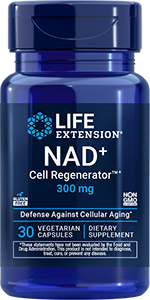
How to Take NAD Supplements
Published: May 2025
Living a long life in good health is important to us all. And while there are plenty of ways to age well, helping your cells function optimally and providing them with the energy they need to power your body may be among the most important ways.
NAD supplements are becoming increasingly popular to support cellular health. If you haven't heard of it, this molecule is a must as you age. Unfortunately, the body produces less and less of it over time, so your NAD+ levels eventually go down, making supplementing with NAD-boosting supplements even more important.
In this blog, learn more about why NAD-boosting supplements are considered some of the best healthy aging supplements. We'll also cover the various forms of NAD, its important role in metabolism and cellular health, different types of NAD supplements, the benefits it offers, precautions and potential side effects, the ideal dosage and how and when to take your NAD supplements.
What are NAD supplements?
NAD stands for nicotinamide adenine dinucleotide. This is a coenzyme found in all of your living cells. To get a little more specific, NAD is needed to help support metabolism and cellular energy. It is involved in the creation of adenosine triphosphate (ATP), which is the compound that the body uses for fuel.
Important caveat: You can't actually take NAD as a supplement, but rather in the form of NAD+ or NADH. NAD is made by your body and can be present as oxidized NAD+ (in which it accepts electrons from other molecules), or reduced NADH (which donates electrons to other molecules). What you can do is take supplements that boost your body's production of NAD.
There are a few different types of NAD-boosting supplements: there's NAD+, nicotinamide (NAM), and nicotinamide riboside (NR). You may have also heard about NAD-boosting precursors that help support NAD+ levels in the body, including nicotinic acid (NA) and nicotinamide mononucleotide (NMN).
Pro tip: look for formulas that contain NR and not NAD+ because supplementary NR is considered to be more effective for supporting the body's levels of NAD.
Benefits of NAD supplementation
Now that you have a better idea of what NAD is, let's get into how it can benefit you.
Cellular energy production
—As we mentioned off the bat, one of the most important benefits of NAD supplements is how they can support your energy. This is helpful for your body because cellular metabolism (all of the things that happen in your cells to keep you alive) relies on NAD+ to make energy.
Note that when we talk about energy production, we're not referring to the jolt you get when you have a cup of coffee. This isn't about physical energy but rather the energy your body needs so that your cells can function properly. This is what we mean by cellular metabolism. ("Metabolism" is just an umbrella term for a bunch of processes happening inside your body.)Maintaining healthy NAD levels
—NAD supplementation is so important because NAD levels decline with age. In one randomized controlled trial, adults who took 300 mg of nicotinamide riboside showed a 51% increase in NAD+ blood levels, and these effects were noted after just two weeks.Healthy aging
—Because NAD is a crucial component to the different processes in your body, it should come to no surprise that by keeping your levels in the right place, NAD is linked to healthy aging. More specifically, maintaining healthy levels of this compound is important for supporting healthy aging and overall wellness.
Pro tip: We recommend sticking to a product containing the clinically studied form of nicotinamide riboside to support your NAD levels and enjoy these benefits!
Explore Our Best NAD+ Supplements
How Many Sources of NAD Are There?
There are two forms of NAD and various types of NAD supplements. But did you know that NAD can come from both natural and synthetic sources?
Examples of synthetic sources of this molecule include nicotinamide riboside and nicotinamide mononucleotide (NMN). Both of these molecules are converted from their supplementary sources in the body to help support NAD levels.
Natural sources, aka sources that can come from dietary intake of certain foods, include foods that have vitamin B3 (also known as niacin), nicotinic acid and tryptophan.
It bears repeating that when we talk about sources of NAD+, that doesn't necessarily mean you are consuming NAD+. In many cases, you're consuming a precursor that gives the body what it needs to make more NAD+.
This is why including precursors like dietary tryptophan or vitamin B3 in your nutrition—whether via supplements or from foods like meat, fish, or dairy—can help support your NAD levels.
How to take NAD supplements
There is no recommended dietary allowance for NAD supplements, so you might find variations in the dosage recommendations when looking at different products.
That said, 300 mg has been deemed a tolerable dose for supporting healthy NAD levels through the various cells and tissues in your body. Just like any supplement, it's important to follow the dosage guidelines on the bottle and consult with your healthcare provider for more personalized guidance.
Should I avoid taking a NAD-boosting supplement at night?
Since it benefits energy production, you might be wondering if it will keep you up at night if you take it later in the day. Good news! NAD doesn't work like caffeine. While both can provide you with energy, NAD will not keep you up if you take it later in the evening or at night, since, as we mentioned earlier, we're talking about a different kind of energy.
All that is to say, you can take your NAD supplement any time of day, as long as you are taking it at the same time consistently every day. And unless the label on your product says otherwise, you can take NAD supplements with or without food and shouldn't experience any negative effects.
How long until you feel the effects?
In a study examining long-term usage of NAD-boosting supplements and how long it takes for the effects to kick in, the subjects were found to have elevated levels of NAD+ after only two weeks. However, you should continue to incorporate your NAD product into your regimen even after that point to maintain those healthy levels.
Bear in mind that there are several variables that can influence how fast (or slow) nicotinamide adenine dinucleotide works. For example, nutritional and environmental factors can impact cellular NAD levels. Remember to be consistent with your supplementing and you should be well on your way to supporting healthy levels.
Additionally, your daily lifestyle habits can help or hurt the progress you see from NAD supplementation. More on that in a moment!
Are there any side effects to NAD?
While significant side effects aren't common, they do sometimes occur. Because NAD is closely related to niacin, some NAD supplements may cause flushing, although do note that nicotinamide riboside specifically does not lead to flushing.
NAD supplements are generally well tolerated, but you should always consult with your healthcare provider before changing up your supplement regimen.
Tips to complement NAD
One thing you can do to complement your NAD supplements is combine them with resveratrol. This can give you extra energy to combat fatigue and support your healthy aging efforts. Bio-quercetin and fisetin are two more excellent complementary supplements for NAD.
Remember, too, that by definition, supplements complete a whole. There is no powder, capsule, tablet, or any other product strong enough to compensate for overall poor lifestyle choices. This means that if you want your NAD supplements to be effective, you should use them daily alongside a nutrient-dense diet that prioritizes minimally processed foods, plenty of high-quality sleep, physical activity and stress management.
This is how you can best enjoy the benefits of any supplement, including NAD, and age gracefully in the process.
References
- Amjad S, et al. "Role of NAD+ in regulating cellular and metabolic signaling pathways." Mol Metab. July 2021. https://pmc.ncbi.nlm.nih.gov/articles/PMC7973386/
- Cantó C, et al. "NAD(+) Metabolism and the Control of Energy Homeostasis: A Balancing Act between Mitochondria and the Nucleus." Cell Metab. July 2015. https://pmc.ncbi.nlm.nih.gov/articles/PMC4487780/
- Conze D, et al. "Safety and Metabolism of Long-term Administration of NIAGEN (Nicotinamide Riboside Chloride) in a Randomized, Double-Blind, Placebo-controlled Clinical Trial of Healthy Overweight Adults." Sci Rep. July 2019. https://pubmed.ncbi.nlm.nih.gov/31278280/
- Freeberg KA, et al. "Dietary Supplementation With NAD+-Boosting Compounds in Humans: Current Knowledge and Future Directions." J Gerontol A Biol Sci Med Sci. December 2023. https://pubmed.ncbi.nlm.nih.gov/37068054/
- Garten A. "Nutrition, NAD and exercise: vitamin B3 supplements to stay fit and healthy?" Endocrinologist. 2020. https://www.endocrinology.org/endocrinologist/135-spring20/features/nutrition-nad-and-exercise-vitamin-b3-supplements-to-stay-fit-and-healthy/
- Poljsak B, et al. "Healthy Lifestyle Recommendations: Do the Beneficial Effects Originate from NAD+ Amount at the Cellular Level?" Oxid Med Cell Longev. December 2020. https://pubmed.ncbi.nlm.nih.gov/33414897/
- Pradeepkiran JA, et al. "Are mitophagy enhancers therapeutic targets for Alzheimer's disease?" Biomedicine & Pharmacotherapy. May 2022. https://www.sciencedirect.com/science/article/pii/S0753332222003079
Like what you read?
Please subscribe to get email updates on this blog.









